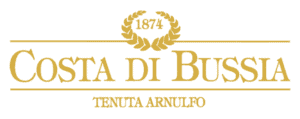Full bodied and long, with perfectly integrated tannins


| Country | Italy |
|---|---|
| Region | Piemonte |
| Sub-Region | Barolo |
| Producer | Costa di Bussia |
| Vintage | 2012 |
| Composition | 100% NEBBIOLO |
When Luigi Arnulfo purchased this estate in 1874, it included already the famous fields of “Campo di Buoi” and “Campo del Gatto”. Today they are precious cru, the heart of the Costa di Bussia consisting of 15 hectares of vineyards that offer particular and complex wines. The soil is mostly marly from the Tortonian age. The starting point to produce wines of great structure intended for a very long life. The label bore the name of the wine, and quite clearly where it came from: the farm of ‘Sir’ Luigi Arnulfo, pharmacist and producer of Barolo at Costa di Bussia, in Monforte.
Tobacco, earth and prune character turns to flowers and freshly sliced fruit with mint undertones. Full-bodied, long, with perfectly integrated tannins and a fine, silky texture. Goes well with beef, lamb, Veal, mature and hard cheese, and mushrooms.
Native red-berry vineyard. The oldest and most noble vineyard of Piedmont, maybe of Italy. Known also as the appellation “queen of the red grapes”, the nebbiolo needs careful and diligent care. It gives birth to strong wines, rich in alcohol, that need a long ageing to achieve those characteristics that make them superior and popular worldwide. A difficult vineyard in terms of soil exposition, treatment and fertilization. Strong, calcareous and tough yet rich soils are perfect for this vineyard that sprouts early, in the middle of April, and matures quite later in the middle of October. It’s sensitive against sudden changes of temperature. It prefers a constant weather, on sunny hills, South/South-West oriented, between 200 m and 450 m high, to be preserved from freeze.
We have set out to achieve the very best by leaving the finest bunches on the vines during the grape harvest so that they can be picked when they will have had the opportunity to ripen still further and will produce a more concentrated Barolo. Manual harvest with qualitative selection of grapes. Destemming of the grapes to separate the stalk from skins, soft crushing. Cold maceration in stainless steel for six hours to extract the color and the aromatic substances from the skins. Pressing of the fermented lees. Racking and fermentation in stainless steel, with automatic start of the malolactic fermentation. Pouring and refining storage in stainless steel for a few weeks.Ageing for 30 months, 3000 liters in Oak barrels to develop its bouquet. Bottling by inert atmosphere. Refining storage in the bottle at a controlled temperature (14 degrees C.) and humidity (75%) for at least 6 months.